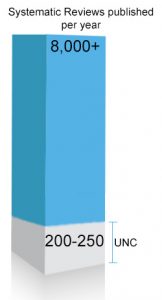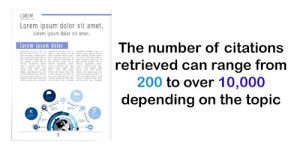Starting a Systematic Review? HSL can help!
When Rachael Posey, Eshelman School of Pharmacy liaison and Systematic Review Coordinator for the Health Sciences Library, consults with researchers on starting a systematic review, their reaction is similar. “They are surprised at how much the librarians do and how much information they know. Many just expect the librarians to show them how to search and send them on their way,” noted Posey.

The Cochrane Handbook for Systematic Reviews of Interventions states, “a systematic review attempts to collate all empirical evidence that fits pre-specified eligibility criteria in order to answer a specific research question. It uses explicit, systematic methods that are selected with a view to minimizing bias, thus providing more reliable findings from which conclusions can be drawn and decisions made.” 1 The HSL initially consults with the researchers to help formulate the search strategy and help with citation retrieval. Depending on how much the librarians are involved in the process, they will usually meet one to two times with the researchers. With an average systematic review taking between 12 to 18 months to complete, the librarians may not hear from a researcher for over a year after the citations are sent to the researcher.

Since January 1, the HSL has consulted on an initial 37 systematic reviews. In 2016, over 8,000 systematic reviews were published in the health literature.2 Posey estimated that UNC publishes an average of 200 to 250 per year. The value the Library brings to this process is the ability to help researchers define what information they need and how to manage expectations, especially on broad topics or topics with various definitions. Librarians bring their knowledge of the subject matter and the literature to help create search queries that find the citations needed for a solid review.
The liaison librarians all have a baseline knowledge of the techniques for conducting a systematic review. They continue to receive training on new techniques and resources available. The Library is working to bring more staff onboard to help with citation de-duping and merging, and pdf retrieval for researchers. The number of citations retrieved for a systematic review can range from 200 to over 10,000 depending on the topic. All that is asked of the researchers is an author credit for the librarian or at the least an acknowledgement.

However, the Library is not sitting back and waiting for researchers to come looking for help. The HSL offers a two-part series on systematic reviews monthly and are actively teaching courses within the Health Affairs Schools where a systematic review is required. School of Nursing liaison Beth Moreton is co-teaching a class of nearly 150 nursing students on conducting a systematic review. HSL librarians are also helping to teach systematic review courses in Public Health and in Exercise and Sport Science.
HSL librarians have also presented two courses on systematic reviews for librarians at the Mid-Atlantic Chapter of the Medical Library Association annual meeting. HSL is currently the only library is the Mid-Atlantic and Southern regions of the US to offer continuing education classes on the full systematic review process for librarians.
Posey encouraged researchers to contact the HSL if they are working on or thinking about doing a systematic review. “We can make the process easier,” stated Posey. Researchers are encouraged to initiate a consultation via our Ask A Librarian service. A brief description of the research topic is required so that the subject expert within the library will be assigned to work with the researcher. If they have a PICO (Patient or problem, Intervention, Comparison, and Outcome) scenario, it helps but is not required.
For more information on systematic reviews, visit our guide.
1 Higgins, Julian. Cochrane Handbook for Systematic Reviews of Interventions. Hoboken, NJ, USA: John Wiley & Sons, 2009. ProQuest ebrary. Web. 7 October 2014.
2 Epidemiology and Reporting Characteristics of Systematic Reviews of Biomedical Research: A Cross-Sectional Study Moher D., Page M.J., Shamseer L., Altman D.G., Tetzlaff J., Sampson M., Tricco A.C., (…), Sarkis-Onofre R. (2016) PLoS Medicine, 13 (5) , art. no. e1002028 , pp. 30. [http://dx.doi.org/10.1371/journal.pmed.1002028]






